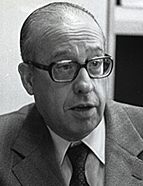

In 1988, on his retirement, his disciples, admirers, and followers published Estudos e Ensaios em Homenagem a Vitorino Magalhães Godinho [Studies and Essays in Honour of Vitor Magalhães Godinho] which featured articles by Frédéric Mauro, Alberto Tenenti, Albert Silbert, Immanuel Wallerstein, S. N. Eisenstadt, Michel Morineau or Suzanne Daveau, besides articles by his Portuguese fellow researchers and disciples.
Magalhães Godinho considered his life had been oriented by three major vectors: teaching, scientific research, and civic intervention. By turning 70, teaching would come to an end although he continued to hold conferences, take part in meetings and occasionally (as was the case in 1993) act as examiner in academic proceedings. His teaching days had, however, come to an end.
His permanent enriching and lively contact with students was now over, but he lived for another 23 years, without ever forbearing the remaining two activities he had begun at an early age; he continued to publish very many books and articles, released here and there, and wherever his collaboration was requested (invitations he often declined). He integrated the Comissão de Ciências Humanas e Humanidades [Committee for Human Sciences and Humanities] of the European Science Foundation, where he drove key factors for research, such as accepting being elected for the Instituto Histórico e Geográfico Brasileiro [Brazilian Institute for History and Geography], as a correspondent of the Academia Brasileira de Letras [Brazilian Academy of Letters], and member of the British Academy. He was awarded a prize by the Balzan Foundation, in 1991, the highest tribute to his teaching activity and to the quality of his research and work as a historian. He never ceased to perform his civic duties, with public interventions that were, at times, feisty. He was a researcher without a work centre, though he often advocated for its foundation; he dreamt it might be a kind of Instituto Português de História dos Descobrimentos e da Expansão Europeia [Portuguese Institute of the History of Discoveries and European Expansion]. Only after such an Institute was founded, could meaningful commemorations be held – since 1947 he had been fighting against the commemorativism fostered by the official bodies. The foundation of this Institute had either failed as a result of his proposals being rejected, or in view of the total autonomy he demanded. It was a shame that these differing positions failed to be reconciled to enable Magalhães Godinho to supervise works on the Portuguese reality. In 1990, he published Mito e Mercadoria, Utopia e Prática de Navegar – séculos XIII – XVIII [Myth and Merchandise/Commodities, Utopia and The Practice of Navigation - 13th-18th Centuries].
